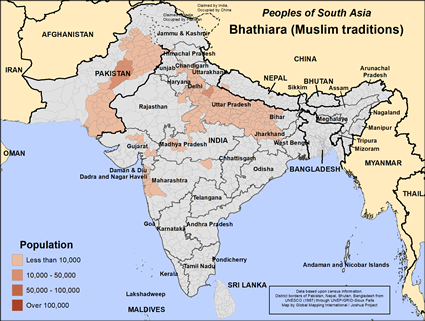Bhathiara (Muslim traditions) in India

Photo Source:
Anonymous
|

Map Source:
People Group data: Omid. Map geography: UNESCO / GMI. Map Design: Joshua Project.
|
| People Name: | Bhathiara (Muslim traditions) |
| Country: | India |
| 10/40 Window: | Yes |
| Population: | 189,000 |
| World Population: | 375,000 |
| Primary Language: | Hindi |
| Primary Religion: | Islam |
| Christian Adherents: | 0.00 % |
| Evangelicals: | 0.00 % |
| Scripture: | Complete Bible |
| Ministry Resources: | Yes |
| Jesus Film: | Yes |
| Audio Recordings: | Yes |
| People Cluster: | South Asia Muslim - other |
| Affinity Bloc: | South Asian Peoples |
| Progress Level: |
|
Introduction / History
The Bhathiara are a Muslim people who live in north India. Their name comes from a word for "boiled rice." The Bhathiara claim to be descendants of the last Pathan ruler of the Suri Empire of the 16th century. The traditional occupation of the Bhathiara was that of innkeeper. They would house and feed Muslims along the trade routes of north India. The Bhathiara would provide a mat and a place to sleep for a modest price. They would provide rice, curry, kabobs and water for Muslims travelers. During the Mughal period they were provided with royal patronage.
The job of being innkeepers has declined among the Bhathiara in modern times.
Now they work in agriculture, factories and in small businesses. Some Bhathiara have taken advantage of Indian's educational system and become professionals in medicine, law, engineering and computer science.
Lack of education is a problem among the Bhathiara. The literacy rate among their women is only 62%.
The primary language of the Bhathiara is Urdu. They also speak other regional languages.
Where Are they Located?
The vast majority of the Bhathiara of Muslim tradition live in the Indian state of Uttar Pradesh. Smaller numbers live in Haryana, Bihar, Maharashtra and Gujarat. A large population of Muslim Bhathiara also lives in the nearby nation of Pakistan.
What Are Their Lives Like?
The Bhathiara often live in their own sections of the cities and villages in Uttar Pradesh. They are strictly endogamous, that is, they marry within their caste and clan. Families arrange marriages with the consent of the young people. Sons inherit their father's property. Newly married couples frequently live with or near the groom's parents. Muslim priests officiate at important life events like births, weddings and funerals. The Bhathiara bury their dead.
The Bhathiara are not vegetarians. They eat meet except for pork. Their main foods are wheat, rice, lentils, vegetables and dairy products.
Caste councils promote their interests and settle legal disputes.
What Are Their Beliefs?
The Bhathiara practice Sunni Islam, the largest branch of Islam. They attempt to obey the teachings of the Qur 'an and the prophet Muhammad. They believe that by following the Five Pillars of Islam that they will gain entrance into heaven upon their death. The Bhathiara pray five times a day towards Mecca, attend Mosque services on Fridays and fast during the month of Ramadan. If a Bhathiara has the means, he or she will make a once in a lifetime pilgrimage to Mecca called the Hadj.
The two most significant holidays of the Bhathiara are Eid al Fitr, the breaking of the month fast and Eid al Adha, the feast day in celebration of Abraham's willingness to sacrifice his son to Allah.
What Are Their Needs?
The Bhathiara need to hear and understand the life-changing message of Isa or Jesus. They need to see the love and mercy of Christ lived out in practical ways before them by Christians. They would benefit by job training skills and help in educating their women and children. They need to see that Jesus is not a merely prophet, but that He is the Lord and Savior of the world.
Prayer Points
Pray for Bhathiara families to be drawn to Jesus and to the Bible to find out more about this man, Jesus.
Pray for Bhathiara families and communities to discover and embrace the free gift of life found by trusting Christ and his finished work.
Pray that the Bhathiara would be open to the gospel and that the Lord would raise up Bible-believing churches among them.